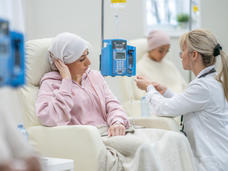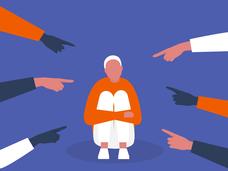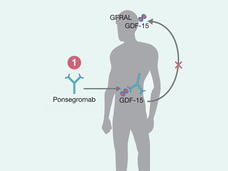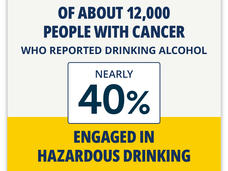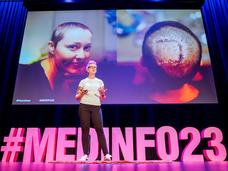Survivorship & Supportive Care - Cancer Currents Blog
News on research that affect cancer patients and survivors. Topics include managing treatment side effects, fertility preservation, and cancer’s long-term effects.
-
For AYAs with Advanced Cancer, Study Finds Serious Communication Gaps About Their Care
Documented conversations on goals of care are uncommon in AYA patients with advanced cancer. Researchers found that many patients did not have these discussions until the last month of life, and many asked about palliative care.
-
Study Aims to Reduce Lung Cancer Stigma by Teaching Health Professionals Empathy
Researchers at Memorial Sloan Kettering Cancer Center have developed a training program to help health providers reduce lung cancer stigma. In this interview, they discuss an ongoing NCI-funded nationwide clinical trial to test the training.
-
Helping Kids with Cancer Speak for the Supportive Care They Need
Younger cancer patients who filled out surveys about their symptoms experienced fewer cancer-related symptoms than those who did not complete the surveys, results from two clinical trials have shown. The findings show patient-reported outcome (PRO) surveys for children can give an accurate picture of how a child is feeling during the stress of treatment.
-
Delivering Palliative Care by Telehealth Meets the Needs of People with Cancer
In a study of people with advanced lung cancer, palliative care delivered via telehealth was just as effective at improving patients’ quality of life and other measures of well-being as care delivered in person.
-
Program Connects Adolescents and Young Adults to Quality Cancer Care
A 10-year-old program at an NCI-Designated Cancer Center has had substantial success at increasing the number of adolescents and young adults with cancer who get recommended treatment and services, including greater clinical trial participation and use of fertility services.
-
Will Ponsegromab Be a Game Changer for Cancer Cachexia?
In a clinical trial, people with advanced cancer and cachexia treated with the experimental drug ponsegromab gained an average of 2 to 6 pounds over 12 weeks, depending on the dose they received. Participants treated with the placebo lost an average of 1 pound over the same time period.
-
As More People with Cancer Use Medical Cannabis, Oncologists Face Questions They Struggle to Answer
Up to 40% of people being treated for cancer use cannabis to help with side effects like pain and anxiety. But with evidence from studies on cannabis lacking, clinicians feel ill-equipped to answer patient questions about its safety and effectiveness.
-
Jaw Problems Linked to Bone-Modifying Drugs Not as Rare as Once Thought
Osteonecrosis of the jaw was thought to be a rare side effect of drugs like denosumab (Xgeva) that lessen bone problems when cancer has spread to the bone. But a new study has found that the painful side effect is more common than once thought.
-
Treating the Whole Person: How Cancer Centers Are Addressing Social Needs
While treating people’s health-related social needs has always been a part of health care in one form or other, cancer centers and community cancer clinics increasingly are viewing the people they treat through a social lens and addressing social needs—including transportation, food, and housing—as part of patient care.
-
Program Helps Medically Underserved, Minority Cancer Survivors Be More Active
A program in Texas helped minority and medically underserved cancer survivors get much more physical activity, according to a new study. Participants also reported improved physical functioning and quality of life.
-
Spurred by Survivors, Researchers Are Revisiting Cancer Drug Doses
When it comes to cancer drugs, researchers are moving away from a paradigm called the maximum tolerated dose. Instead, they’re focusing more on identifying doses that produce fewer side effects but are still effective against a person’s cancer.
-
New Approach May Help People with Cancer Better Manage Depression, Pain, and Fatigue
Assessing and offering people with cancer stepped collaborative care may help better manage symptoms of depression, pain, and fatigue than the standard referral to providers for treatment, according to a recent study.
-
For People with Inherited Risk of Stomach Cancer, Gastrectomy Has Lasting Consequences
In a recent study, more than 90% of people who’d had their stomach surgically removed to prevent cancer experienced a least one chronic complication 2 years out from their surgery. For some, the complications are life altering.
-
Virtual Mind–Body Fitness Classes Show Unexpected Benefit in People with Cancer
In a clinical trial, people being treated for cancer who participated in virtual mind–body fitness classes were less likely to be hospitalized, and had shorter stays when they were hospitalized, than people who did not take the classes.
-
Study Finds Shortcomings in Monitoring Caregivers' Emotional Health
In a survey of more than 100 US community cancer clinics, only 16% routinely screened informal caregivers of their patients for distress. In contrast, more than 90% regularly screened patients for distress and provided referrals to supportive care services.
-
Drinking Alcohol, Often Heavily, Common among People with Cancer and Long-Term Survivors
Many people being treated for cancer and longer-term cancer survivors reported regularly drinking alcohol—some heavily and often, a new study shows. The study’s leaders said the findings should be “wake-up call” for cancer care providers.
-
Cholesterol Drug May Help Protect the Heart during Chemotherapy for Lymphoma
The cholesterol-lowering drug atorvastatin (Lipitor) may help reduce the risk of heart failure in people with lymphoma who receive chemotherapy drugs called anthracyclines, results from a clinical trial suggest. Anthracyclines, such as doxorubicin, are used to treat many types of cancer.
-
Engaging People with Low-Grade Glioma in Cancer Research
An NCI-supported study called OPTIMUM, part of the Cancer Moonshot, was launched to improve the care of people with brain tumors called low-grade glioma in part by bringing them into glioma-related research.
-
Three-Drug Regimen Improves Protection against GVHD after Stem Cell Transplant
A large clinical trial has shown that in people with blood cancers, a cyclophosphamide-based regimen better protects against graft-versus-host-disease (GVHD) after an allogeneic stem cell transplant than the standard regimen.
-
Financial Navigation Can Reduce the Financial Toxicity of Cancer Care
The high cost of cancer care can cause added distress and life disruptions for patients as well as their loved ones. Researchers at the University of Kentucky Markey Cancer Center found that a financial navigation program saved patients and their loved ones an average of about $2,500 each.
